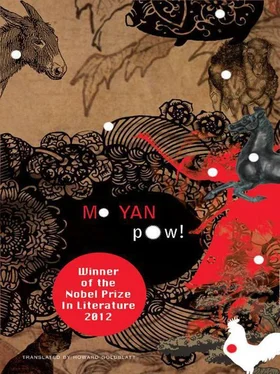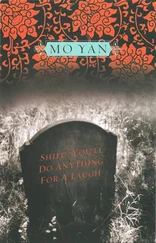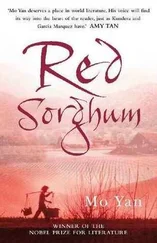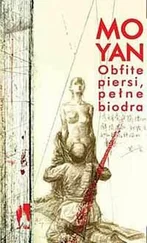In the end, those glittering objects did spill from of her eyes and onto her cheeks and became tears, creating such an abruptly solemn feeling in me that my eyes grew moist too. Under no circumstances was I going to allow the wetness in my eyes to spill out onto my cheeks and turn into tears, not if I wanted to retain my dignity in front of my dimwitted classmates and not lose every last shred of significance in my verbal battle with the teacher. So I stood up and walked out of class.
I went through the gate and out onto Hanlin Bridge, where I leaned over the railing to watch the green water flowing below. There I saw little black fish not much bigger than mosquito larvae swimming along, their numbers greatly diminished when a much larger fish surged through with its mouth open. A comment I'd once heard popped into my head: Big fish eat little fish, little fish eat shrimps, shrimps eat silt. The only way to keep from being eaten is to be bigger than others. I sensed that I was already one of the big ones, though not big enough. I had to grow, and grow quickly. My eye caught a cluster of tadpoles, a tight, black, quivering mass rushing through the water, like a black cloud. Why had the big fish dined on little fish but not the tadpoles? Why, I wondered, do people, cats, kingfishers, with their long beaks and short tails, and lots of other creatures eat little fish but not tadpoles? Basically, I figured, because they don't taste good. But how would we know they don't taste good if we never tried them? Once again, basically, because of their appearance. Ugly creatures don't taste good. On the other hand, snakes, scorpions and locusts are ugly things and yet people fight over them. No one ate scorpions till the 1980s, when people began to treat them as gourmet food and they appeared on all the finest tables. My first taste came at one of Lao Lan's banquets. I want everyone to take note that, in the wake of our New Year's visit to Lao Lan, I became a regular guest at his home, spending lots of leisure time there, alone or with my sister. His wolfhounds treated us almost as family: now, when we walked in, we were greeted with wagging tails instead of menacing barks. But back to my original question: Why don't people eat tadpoles? Could it be because they're slimy, snotty-looking things? But so are snails, and people love them. Or is it because tadpoles come from toads, and toads are poisonous? But tadpoles come from frogs, too, and many consider frogs a delicacy. And not just people—there's a cow in our village that loves frogs. So why don't people eat the young creatures that will grow into frogs? I couldn't make sense of it, and couldn't help thinking that the world was a very puzzling place. But if there's one thing I knew, it was that only well-informed youngsters like me contemplated these complex issues. I was faced with a great many questions, not because I lacked knowledge but because I possessed it. I didn't think much of my homeroom teacher, but was grateful to be the target of that last comment of hers—perverse logic. I felt that her evaluation of me was quite fair. What sounded like a curse was, in truth, lavish praise. My classmates knew the meaning only of one part—perverse—with no chance of grasping the whole idea—perverse logic. To take it a step further: How many people in the village knew the meaning of perverse logic? I did, and without recourse to a teacher. In essence, perverse logic is a perverse way of thinking about things.
In accordance with my perverse logic associated with tadpoles, I began thinking about swallows. Actually, the thought about swallows didn't come out of nowhere. Some were flying low over the river at the moment, and they were so beautiful in flight. They skimmed the surface, raising tiny waves with their bellies and sending ripples to the banks. Others stood on the banks and dug their beaks into the mud. This was the season for building nests—apricot trees were in bloom, and buds on peach trees were waiting their turn to flower. There were new leaves on riverside weeping willows, and cries of cuckoos came on the air from afar. Everyone knew it was time for planting, but no one in Slaughterhouse Village worked the fields any more—it was a tiring, sweaty way to make a meagre living. Who but a moron would do that? There definitely were no morons in Slaughterhouse Village, where the fields were left fallow. When he returned home, my father planned to take up the plough, but that never happened. Lao Lan had given him the responsibility of managing the United Meatpacking Plant, while he himself was chairman and general manager of its parent company, the newly created Huachang Corporation.
Father's plant was half a li east of the school, within sight of the bridge. Originally housing a number of canvas-production workshops, the buildings had been restructured for animal slaughter. Every creature that entered one of the buildings, except for the humans, went in alive and came out dead. I was much more interested in the plant than I was in school, but Father would not let me near it. Nor would Mother. He was the plant manager, she its bookkeeper and many of the village's independent butchers its workforce.
I sauntered towards the plant. After being thrown out of class, I experienced a sense of unease over what I considered to be a smallish mistake—at first, that is. But that feeling left me as I strolled along on that glorious spring day. How incredibly foolish to sit cooped up inside a room listening to a teacher chatter away during that wonderful season. No less foolish than going out to tend a field day after day, knowing it only put you deeper in debt. Why should I have to go to school? The teachers didn't know any more than I did, perhaps even less. And while I knew practical, useful things, everything they knew was useless. Lao Lan had been right about everything except when he told my parents to send me to school. It was also a mistake to have them enrol my sister in preschool. I was tempted to rescue her from her ordeal and explore the secrets of nature with her. We could fish in the river with our bare hands, we could climb trees and trap birds, we could pick wildflowers in open fields. There was no limit to the things we could do, and every one of them was better than being in school.
From my hiding place behind a riverside willow tree, I surveyed Father's plant, a large compound surrounded by a high wall topped with barbed wire. It looked more like a prison—rows of high-ceiling factory buildings inside the wall, with a row of squat buildings in the southwest corner in front of a massive smokestack belching out thick smoke. That, I knew, was the plant's kitchen, the source of the meaty aroma that frequently assailed my nostrils, even when I was in class. When that happened, my teacher and my classmates ceased to exist and my mind filled with beautiful images of meat that expelled bursts of heated fragrance as it lined up and hopped along a road paved with garlic paste and coriander and other spices, heading straight for me. I could smell it now. I had no trouble picking out the smell of beef, of lamb, of pork and of dog, and beautiful visions swam in my head. Yes, in my head, where meat always has form and is imbued with language; meat is a richly evocative living thing with which I enjoy a close relationship. These meats call out to me: ‘Come eat me! Come eat me, Xiaotong, and hurry.’
The gate was shut, even though it was midday. Unlike the school gate, which was made of finger-thin steel bars with gaps wide enough to allow a young calf through, this was a sturdy double-panelled gate made of two iron plates that would require a pair of strong young men to push it open and pull it shut, two extremely creaky operations. Later, when I watched it being opened and shut, it was just as I'd assumed.
The smell of meat drew me down off the riverbank and across the broad paved road, where I waved to a black dog out for a stroll. It looked up and gazed at me with the eyes of an old man living out his sad days, then made its way over to a roadside building, turned and lay down in the doorway, where a wooden sign, painted white with writing in red, hung on a brick wall. I didn't know those words but they knew me. The place, I knew, was the plant's new inspection station. All the meat from Father's plant passed through here. Once it received the blue stamp of approval, it was on its way to wholesalers throughout the county, the province and beyond. No matter where it went, that stamp was all it needed to be sold on the open market.
Читать дальше












